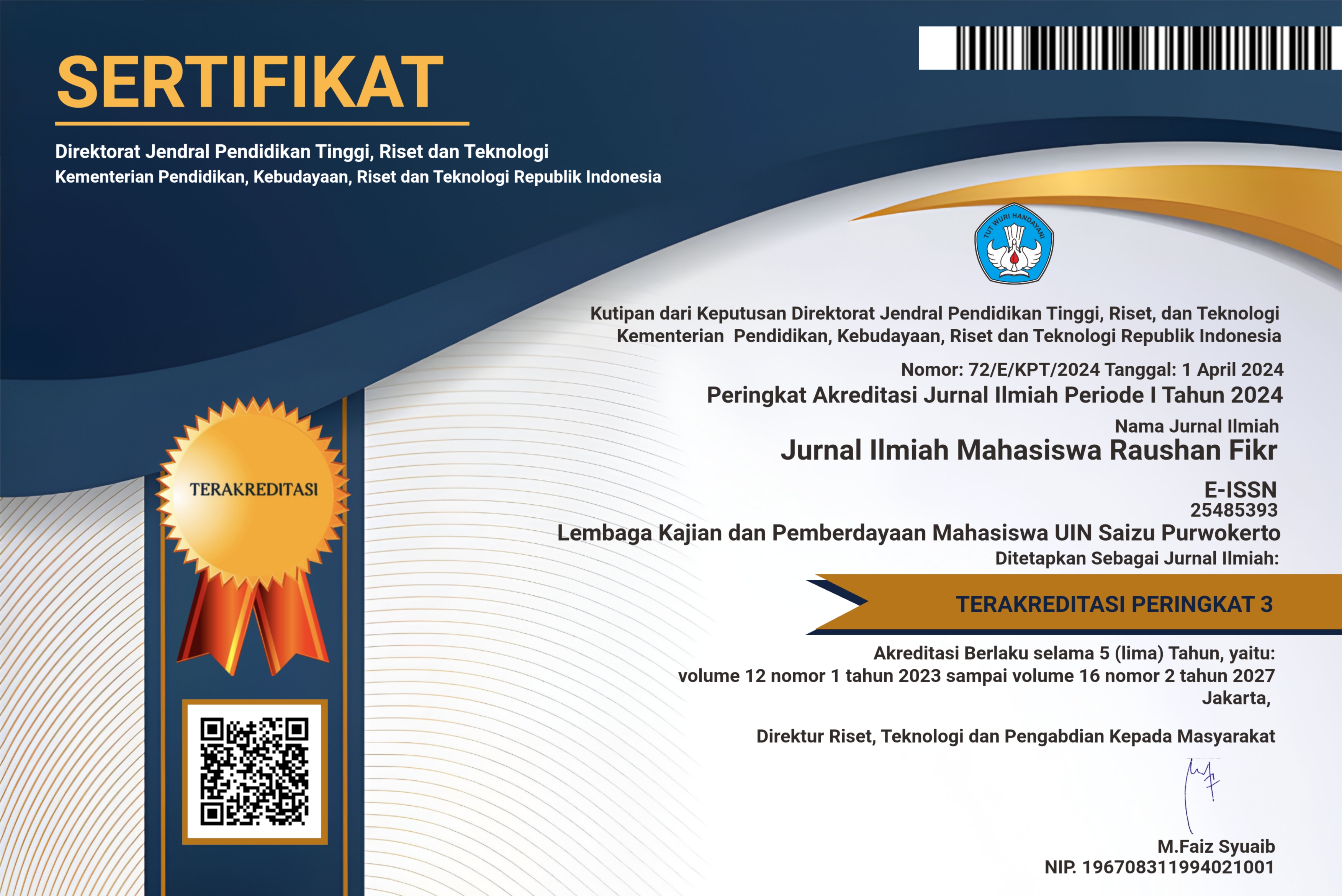WAWASAN AL-QUR'AN TENTANG RADIKALISME DAN PENANGANANNYA DI ERA MILENIAL
DOI:
https://doi.org/10.24090/jimrf.v8i1.2970Keywords:
Radicalism, the Qur’an and information technologyAbstract
This paper seeks to examine the insights of the Qur’an about radicalism and how to deal with it in the millennial era by utilizing information technology to realize moderate Islam. At present the notion of radicalism has spread through various means and has become a troubling problem. This needs to be dealt with seriously in order to realize peace and tranquility in life throughout the world. Al-Qur’an as a way of life for Muslims also contains things about the problems of mankind, instructions for their settlement and so forth. So in this paper we will examine how the Qur’an talks about radicalism and seek solutions to these problems. Data sources were obtained through literature review and explained descriptively analytically. The study was conducted through a review of several interpretations of the Qur’an and other supporting sources. From this study, the results show that human radical behavior that occurs among humans has been described in Surat al-Baqarah verse 30. Then in this verse also Allah SWT states that he will make a caliph on earth. Departing from this verse, the author tries to contextualize it now so that the millennial generation can play a role in addressing and overcoming the phenomenon of radicalism by utilizing information technology in accordance with the guidance of the Qur’anDownloads
References
Aplikasi KBBI V Offline, Badan Pengembangan Dan Pembinaan Bahasa, Kemetrian Pendidikan Kebudayaan Republik Indonesia, 2016 diakses pada Selasa, 3 November 2018 pukul 23.10 WIB
Az-Zuhaili, Wahbah. 2012. Tafsir Al-Wasith: Al-Fatihah- At-Taubah (Depok: Gema Insani)
Badan Nasional Penanggulangan Terorisme, Strategi menghadapi Paham Radikalisme Terorisme- ISIS, http://belmawa.ristekdikti.go.id/wp-content/uploads/2016/12/Strategi-Menghadapi-Paham-Radikalisme-Terorisme.pdf&ved= 2ahUKEwjNrvC927veAhUHPY8KHTJRBVgQHFjAAegQIAxAB&usg= AovVaw1j25DcIZdJHrDz86eJoIDH diakses pada 5 November 2018 pukul 05.03 WIB
Hardoko, Ervan. 2016. 10 Aksi Teror Paling Banyak Memakan Korban Jiwa Sepanjang Abad 21, http://style.tribunnews.com/2016/09/11/10-aksi-teror-paling-banyak-menelan-korban-jiwa-sepanjang-abad-21?page=4 diakses pada 6 November 2018 pukul 12.41 WIB
Hartadi, Budi. 2018. Bom Meledak di 3 Gereja di Surabaya. https://m.detik.com/news/berita/d-4018010/bom-meledak-di-3-gereja-di-surabaya diakses pada 7 November 2018 pukul 02.50 WIB
Juhri, Muhammad Alan Dakwah Anti Radikal Perspektif Al-Qur’an Dalam Merawat Kebhinekaan Indonesia (Telaah Kandungan Ayat-ayat Dkawah Qs. An-Nahl: 125 dan Qs. Al-Baqarah : 256) dalam Senarai Penelitian Islam Kontemporer: Tinjauan Multikultural (Yogyakarta: Deepublish Publisher: 2018)
Lajnah Pentashih Mushaf Al-Qur’an. 2017. Tafsir Al-Qur’an Tematik. Jilid 8 Cetakan Keempat (Jakarta: Kamil Pustaka)
Lajnah Pentashih Mushaf Al-Qur’an. 2017. Tafsir Al-Qur’an Tematik. Jilid 9 Cetakan Keempat (Jakarta: Kamil Pustaka)
Lajnah Pentashih Mushaf Al-Qur’an. 2017. Tafsir Al-Qur’an Tematik. Jilid 1 Cetakan Keempat (Jakarta: Kamil Pustaka)
Mundir. 2016. Menakar Kebebasan Media Massa Dan Radikalisme Agama. Jurnal Edcomtech Volume 1 No. 2 Oktober 2016
Ro’uf, Abdul Mukti. Mengurai Radikalisme Agama Di Indonesia Pasca Orde Baru dalam Jurnal Ulumuna Volume XI No. 1 Juni 2007
Shihab, M. Quraish. 2000. Tafsir Al-Misbah: Pesan, Kesan dan Keserasian Al-Qur’an. Jilid 1 Cetakan Pertama (Ciputat: Penerbit Lentera Hati)
Taher, Andrian Pratama. 2017. Facebook Masih Jadi Lahan Penyebar Paham Radikalisme di Indonesia, https://tirto.id/facebook-masih-jadi-lahan-penyebar-paham-radikalisme-di-indonesia-cA9w diakses pada 7 November 2018 pukul 14.42 WIB
Umar, Ahmad Rizky Mardhatillah. Melacak Akar Radikalisme Islam di Indonesiam. Jurnal Ilmu Sosial dan Ilmu Politik Volume XIV No. 2
Downloads
Published
How to Cite
Issue
Section
License

This work is licensed under a Creative Commons Attribution-NonCommercial-ShareAlike 4.0 International License.
Authors who publish with this journal agree to the following terms:
- Authors retain copyright and grant the journal right of first publication with the work simultaneously licensed under a Creative Commons Attribution-NonCommercial-ShareAlike 4.0 International License that allows others to share the work with an acknowledgement of the work's authorship and initial publication in this journal.
- Authors are able to enter into separate, additional contractual arrangements for the non-exclusive distribution of the journal's published version of the work (e.g., post it to an institutional repository or publish it in a book), with an acknowledgement of its initial publication in this journal.
- Authors are permitted and encouraged to post their work online (e.g., in institutional repositories or on their website) prior to and during the submission process, as it can lead to productive exchanges, as well as earlier and greater citation of published work (See The Effect of Open Access).
















